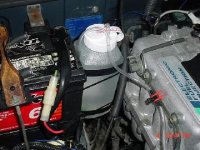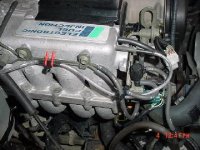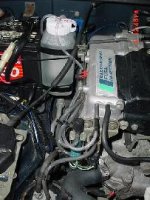- Joined
- Feb 21, 2003
- Messages
- 26,976
- Location
- SE Michigan in the middle of nowhere
- Tractor
- Kubota M9000 HDCC3 M9000 HDC
Okay, it's time to pick the collective brains at TBYNet.
I was reading in some magazine a while ago about putting water injection on automotive gasoline engines to improve the fuel mileage.
I remember in the 60's, during the gas rationing, putting water injection on high compression engines to reduce spark knock from running regular gas in a premium gas engine.
Anyway, I went and installed a water injection unit on my farm car, a 1994 Suzuki Sidekick (not a high compression engine by any means).
I made a really simple and cheap unit. I purchased a quart refrigerator bottle with a screw on lid and a snap spout, and aquarium starter package (air stone, vinyl tubing, 2 needle valves and 2 tees). Total cost: $4.00 I also purchased a gallon of distilled water and a pint of 99% isopropyl alcohol. The alcohol keeps the water from freezing here in Michigan (it's winter).
I teed the feed line into a ported vacuum line running into the plenum that feeds the intake runners for the fuel injection unit. I regulate the water feed with a needle valve. I consume about 1/2 pint of water mixture a week.
Here is the best part.........
My mileage was about 30.5 for city driving (back and forth to work). That's not too bad really, but....
My mileage jumped to 35.0 in the city. The engine "feels" peppier and it starts much easier. I had a decided deceleration flat spot about 35 mph. It's gone.
My question is why?
I don't understand what the water is doing inside the engine other than it works.
Any thoughts on this??
I was reading in some magazine a while ago about putting water injection on automotive gasoline engines to improve the fuel mileage.
I remember in the 60's, during the gas rationing, putting water injection on high compression engines to reduce spark knock from running regular gas in a premium gas engine.
Anyway, I went and installed a water injection unit on my farm car, a 1994 Suzuki Sidekick (not a high compression engine by any means).
I made a really simple and cheap unit. I purchased a quart refrigerator bottle with a screw on lid and a snap spout, and aquarium starter package (air stone, vinyl tubing, 2 needle valves and 2 tees). Total cost: $4.00 I also purchased a gallon of distilled water and a pint of 99% isopropyl alcohol. The alcohol keeps the water from freezing here in Michigan (it's winter).
I teed the feed line into a ported vacuum line running into the plenum that feeds the intake runners for the fuel injection unit. I regulate the water feed with a needle valve. I consume about 1/2 pint of water mixture a week.
Here is the best part.........
My mileage was about 30.5 for city driving (back and forth to work). That's not too bad really, but....
My mileage jumped to 35.0 in the city. The engine "feels" peppier and it starts much easier. I had a decided deceleration flat spot about 35 mph. It's gone.
My question is why?
I don't understand what the water is doing inside the engine other than it works.
Any thoughts on this??



